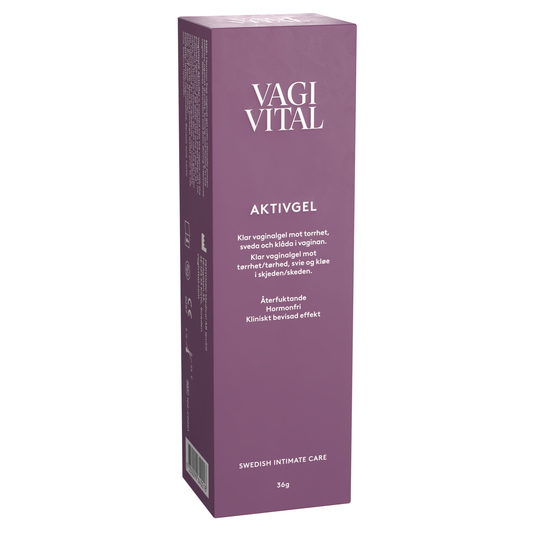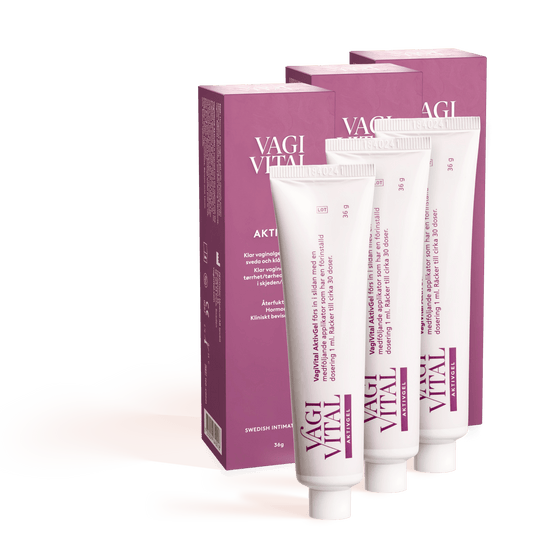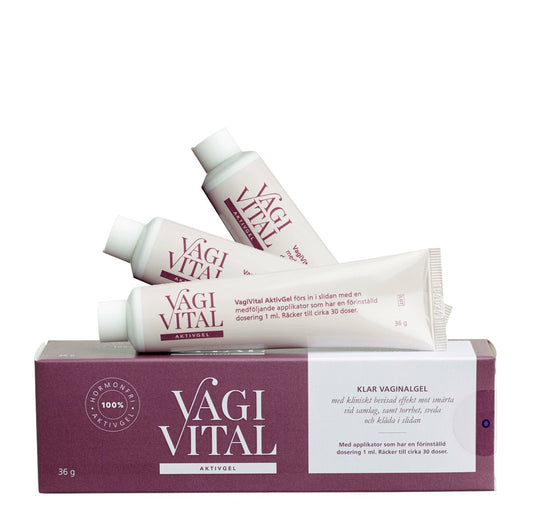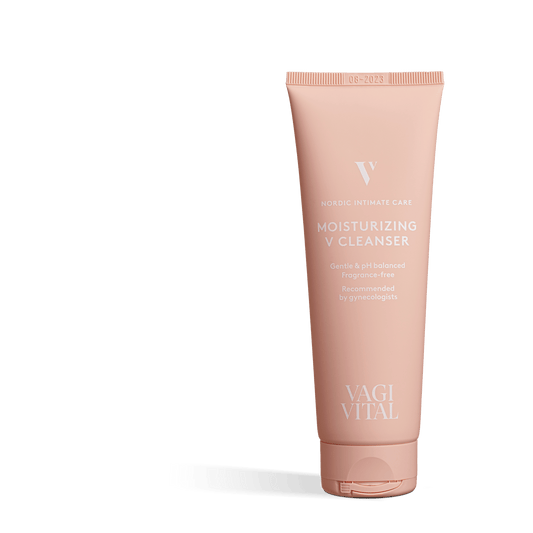Dry mucous membranes during the menstrual cycle
Waking up in a tent on a warm summer day is an experience one rarely forgets. The morning sunlight filtering through the tent fabric makes it very bright inside the tent early on. When the sun starts to warm, a sauna-like feeling is created. The air becomes warm and still, making you feel a bit stuffy and sweaty. I was only 12 years old when one summer I woke up with my family in such a sun-warmed tent and, a little shaken, realized that I had gotten my period for the first time. Unlike many other women in my generation, my mother had told me about menstruation, but despite this preparation, it was still somewhat of a shock. Learning about and trying to live in harmony with the menstrual cycle over the years has been valuable. Because just as the moon goes through several different phases during the menstrual cycle that affect us women both physically and emotionally, few may know that the mucous membranes in the vagina are also affected and change during the different phases of the menstrual cycle. So let's dig a little deeper into that ❤️
CHANGES IN THE MUCOSAL MEMBRANES DURING THE MENSTRUAL CYCLE
Understanding how the mucous membranes in the vagina and vulva are actually affected by the hormonal changes during the menstrual cycle can be a good way to better take care of one's intimate health and well-being.
Here follows a more detailed description of these changes through the different phases of the menstrual cycle:
🌸 Menstrual phase (day 1-5)
The cycle begins with the first day of menstruation when bleeding occurs. It is during this time that the thickened uterine lining (endometrium), which was built up during the previous cycle to receive a fertilized egg, is shed from the uterus and leaves the body through the vagina. The menstrual phase usually lasts from 3 to 7 days. During this time, the vulva may feel more sensitive and irritated due to the blood flow, which can also be worsened by the use of certain types of menstrual products that can dry out or further irritate the skin. After menstruation ends, when estrogen levels are at their lowest, dryness may feel more pronounced, which can contribute to a feeling of discomfort and the need for extra gentle care.
VagiVital V Cleanser is a unique intimate wash that allows cleaning of both water- and oil-based impurities while providing maximum hydration because it contains our proven AktivGel with unique moisturizing properties as well as mild rapeseed oil. Naturally, it is completely free from soap, perfume, and parabens that often disrupt the natural pH balance of the intimate area and the vaginal microflora.
Buy a 3-pack of VagiVital V Cleanser intimate wash and get 10% off here!
🌸 Follicular phase (day 1-13)
At the same time as the menstrual phase begins, the follicular phase starts. This phase involves the maturation of eggs in the ovaries, stimulated by follicle-stimulating hormone (FSH) secreted by the pituitary gland. Estrogen levels begin to rise to repair and rebuild the uterine lining. Although the menstrual phase is technically part of the follicular phase, the follicular phase focuses more on the process leading up to ovulation. The follicular phase ends with ovulation and lasts on average 14 days in a 28-day cycle but can vary from person to person. During the follicular phase, the body slowly begins to rebuild the uterine lining again, driven by increased estrogen levels. This increase contributes to increased natural lubrication in the vagina, making the mucous membranes feel smoother and more hydrated. This period can be experienced as a time of renewed well-being, where the discomfort from menstrual dryness decreases.
🌸 Ovulation phase (day 14, in a 28-day cycle)
Ovulation usually occurs in the middle of the cycle, around day 14 in a 28-day cycle. This is when a mature egg is released from the ovary and travels down the fallopian tube, where it can be fertilized by a sperm. Ovulation is stimulated by a surge in luteinizing hormone (LH), which is also caused by increased estrogen levels. When estrogen levels peak during ovulation, the effect on the mucous membranes becomes most apparent. The increased lubrication is nature's way of facilitating sperm to reach the egg. This time can also bring a peak in sexual desire, where the body feels more responsive and ready for intimacy, a direct effect of the increased moisture and elasticity in the mucous membranes.
🌸 Luteal phase (days 15–28):
After ovulation, the luteal phase begins, during which the empty follicle develops into a structure called corpus luteum. This secretes progesterone and some estrogen, which further thickens the uterine lining in preparation for a possible pregnancy. If the egg is not fertilized, progesterone and estrogen levels drop, the corpus luteum breaks down, and a new menstrual cycle begins. After ovulation, progesterone takes the lead in maintaining the uterine lining, which can cause some women to experience a decrease in natural lubrication. This decrease can cause a feeling of dryness or discomfort, especially while waiting for menstruation to return. It is a time when extra care of intimate hygiene can be particularly valuable.
Take care of your dry mucous membranes with VagiVital AktivGel which you can find here!
PREMENSTRUAL SYNDROME (PMS)
The days before the start of menstruation can be filled with hormonal fluctuations that affect both mood and body. Changes in the feeling and condition of the mucous membranes, such as increased sensitivity or swelling in the vulva, can make this period particularly challenging. Understanding and accepting these changes as part of the natural cycle can help manage symptoms in a more prepared and calm way.
YOUNGER WOMEN ALSO SUFFER FROM DRY MUCUS MEMBRANES
Dry mucous membranes are a condition often associated with menopause, but it is important to emphasize that women of all ages can experience this problem. It is a misconception that only older women are affected; younger women, even those in their twenties and thirties, can also experience dryness in the vaginal area. This dryness can be due to a variety of causes not limited to hormonal changes associated with menopause.
Read more about the causes of dry mucous membranes here!
Ever since that summer morning in the tent 38 years ago, I have actually been careful to record my menstrual cycle. Registering the menstrual cycle in a period app or calendar can be a very good way to gain a deeper understanding of your body's natural rhythms and patterns. This can help you identify what is normal for your body and also better anticipate and understand how your mucous membranes are affected during the different phases of the menstrual cycle ❤️
Take care of yourself & Stay Pussytive ❤️
/Fanny Falkman Grinndal
Business Manager Nordics
Peptonic Medical AB
fanny.falkman-grinndal@peptonicmedical.se
Recommended products for you
- Choosing a selection results in a full page refresh.
- Opens in a new window.













